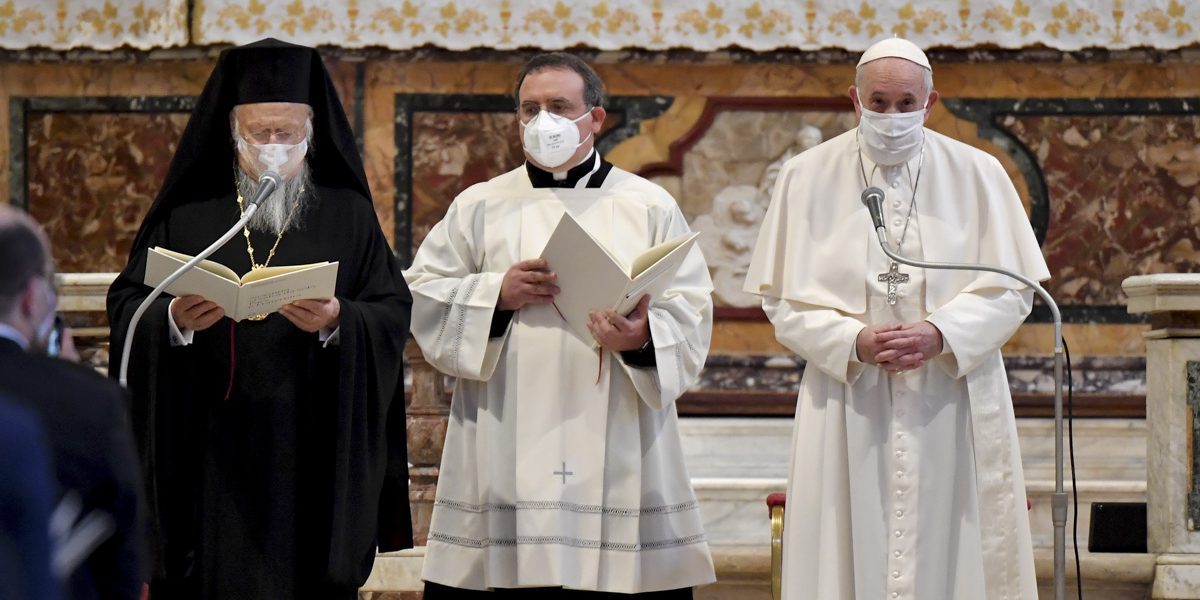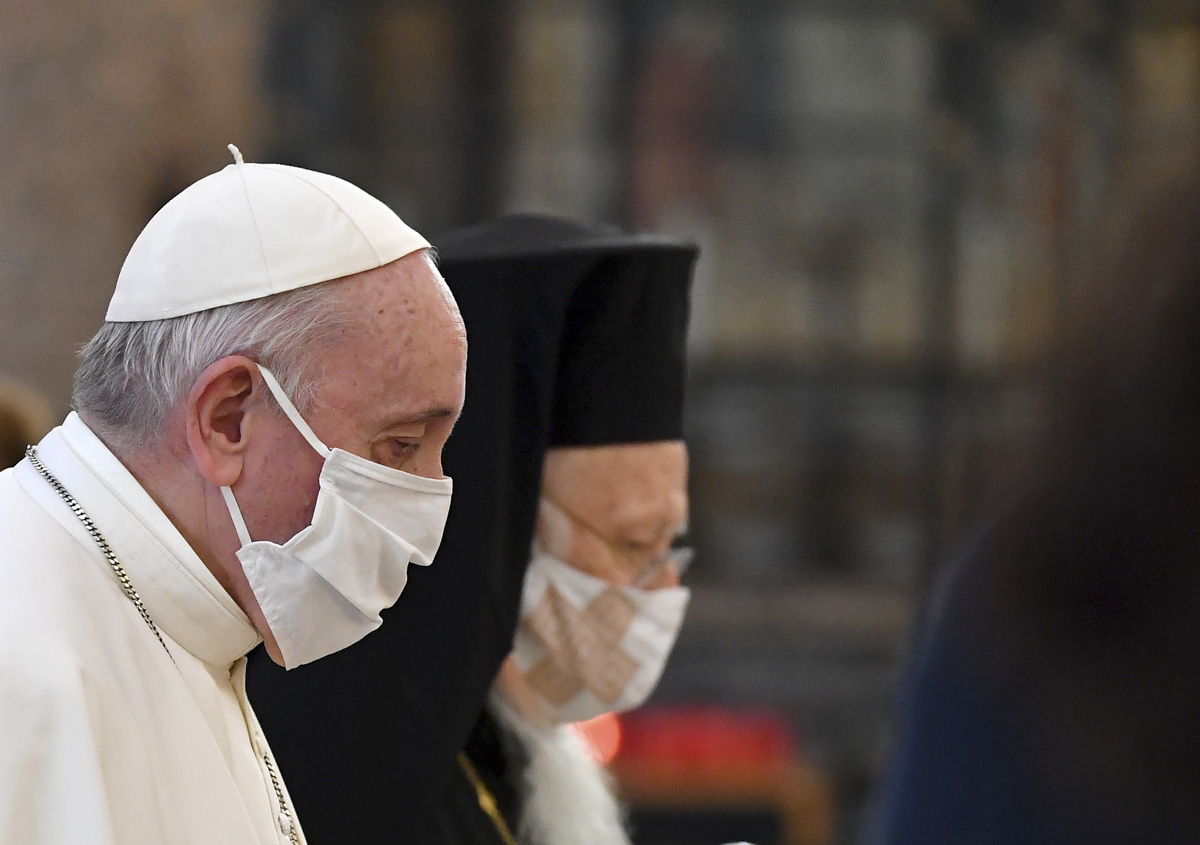To think of only saving ourselves and our own circle is a great temptation, says Pope Francis.On October 27, 1986, Pope Saint John Paul II invited leaders of other religions to join in praying for peace for the human family.
The Cold War hadn’t ended yet, civil wars were raging in Mozambique, Sri Lanka and Guatemala, Eritrea was fighting for independence and the US bombed Libya in a retaliation attack while Zimbabwe’s national army massacred thousands of ethnic Ndebele civilians.
So many of God’s children were suffering because of violence across the globe, but St John Paul II was convinced that peace is holy and that at the heart of every religious tradition is the search for peace and that “Peace is a building site that is open to everyone.”
Pope Francis has embraced this message, as Benedict XVI did before him.
On October 20, an ecumenical prayer service in Rome’s Basilica of Saint Mary in Aracoeli brought the pope together with leaders of other Christian traditions.
Simultaneously, Jews, Muslims, and Buddhists prayed in other city venues before coming together in Michelangelo’s beautiful Square on the Capitoline Hill for an inter-religious ceremony that ended with the proclamation and delivery of the 2020 Appeal for Peace and the lighting of a peace candle.
A minute of silence was observed to remember the victims of wars and of the coronavirus pandemic, and a group of children delivered the appeal to ambassadors and to international political leaders reminding them that “no one is saved alone.”
Who asked Jesus to save himself?
In his homily during the Moment of Christian Prayer for Peace on Wednesday, Pope Francis reflected on the Gospel passage that describes the moments just before Jesus’ death.
This passage, said the pope, speaks of the temptation Jesus experienced amid the agony of the cross. “At the supreme moment of His sufferings and love, many of those present cruelly taunted Him with the words: ‘Save yourself!’ (Mk 15:30).”
Pope Francis explained that the“great temptation” to think of “only saving ourselves and our own circle” is one that spares no one, “including us Christians.”
Though it is a very human instinct, he continued, it is “wrong.” It was the “final temptation of the crucified God,” he said.
Ordinary people
The pope went on to reflect on the words “Save yourself,” and on those who spoke them to Jesus as He hung on the cross.
The first to speak these words were “those who passed by (v.29).” They were ordinary people who had heard Jesus teach and perform miracles. The Pope explained that these people were now telling Jesus to come down from the cross and save Himself. “They only wanted miracles,” he said.
“Sometimes we too prefer a wonder-working god to one who is compassionate.” We want a god in our own image rather than being conformed to His own image, continued the Pope. “But this is not God,” he said, “but our own creation.”
In this way, we prefer the worship of ourselves to the worship of God. Such worship is nurtured and grows through indifference toward others. Those passers-by were only interested in Jesus for the satisfaction of their own desires. Jesus, reduced to an outcast hanging on a cross, was no longer of interest to them. He was before their eyes, yet far from their hearts. Indifference kept them far from the true face of God.
Chief priests and scribes
Pope Francis went on to note that the next people to speak the words “Save yourself” were the chief priests and the scribes: those who had “condemned Jesus, for they considered Him dangerous.” We are all “specialists in crucifying others to save ourselves,” said the Pope.
Jesus, however, allowed Himself to be crucified, “in order to teach us to not shift evil to others,” said the Pope. The chief priests accused Him precisely because of what He had done for others: “He saved others and cannot save Himself!” (v. 31).
The Pope explained that these priests and scribes knew Jesus. “They remembered the healings and liberating miracles He performed, but they drew a malicious conclusion.” To them, said the Pope, saving and helping others is “useless” and Jesus, who gave Himself unreservedly for others, was Himself lost.
The mocking tone of the accusation is garbed in religious language, twice using the verb to save. But the “gospel” of save yourself is not the Gospel of salvation. It is the falsest of the apocryphal gospels, making others carry the cross. Whereas the true Gospel bids us take up the cross of others.

Those who were crucified alongside Jesus
“Finally, those who were crucified alongside Jesus also joined in taunting Him,” continued the Pope. He explained that they were “upset with Jesus” because He did not take them down from the cross. For this reason they said to Him “Save yourself and us!” (Lk 23: 39). They looked to Jesus only to resolve their problems, said the Pope.
Pope Francis noted that “God does not come only to free us from our ever-present daily problems, but rather to liberate us from the real problem, which is the lack of love.” Lacking in love and thinking only of ourselves is the “primary cause of our personal, social, international and environmental ills,” said the Pope. It is “the father of all evils.”
Yet one of the thieves then looks at Jesus and sees in Him a humble love. He entered heaven by doing one thing alone: turning his concern from himself to Jesus, from himself to the person next to him (cf. v. 42).
Calvary: a duel between God and man
Pope Francis then turned his reflections to Calvary, describing it as the site of “a great ‘duel’ between God, who came to save us, and man, who wants to save only himself; between faith in God and worship of self; between man who accuses and God who excuses.”
In the end, said the Pope, God’s victory was revealed; His mercy came down upon the earth.
Jesus’ arms, outstretched on the cross, mark the turning point, for God points a finger at no one, but instead embraces all. For love alone extinguishes hatred, love alone can ultimately triumph over injustice. Love alone makes room for others. Love alone is the path towards full communion among us.
Unity and fraternity
Finally, Pope Francis prayed God might grant us the grace to be more united and fraternal.
“The closer we become to the Lord Jesus, the more we will be open and ‘universal,’ since we will feel responsible for others. And others will become the means of our own salvation: all others, every human person, whatever his or her history and beliefs. Beginning with the poor, who are those most like Jesus.”
In being more fraternal, concluded the Pope, we become more “credible witnesses of the true God.”









